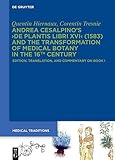Andrea Cesalpino's ›De Plantis Libri XVI‹ (1583) and the Transformation of Medical Botany in the 16th Century : Edition, Translation, and Commentary on Book I / Quentin Hiernaux, Corentin Tresnie.
Material type: TextSeries: Medical Traditions : The Written Memory of World Medicine ; 9Publisher: Berlin ; Boston : De Gruyter, [2023]Copyright date: ©2023Description: 1 online resource (XVI, 251 p.)Content type:
TextSeries: Medical Traditions : The Written Memory of World Medicine ; 9Publisher: Berlin ; Boston : De Gruyter, [2023]Copyright date: ©2023Description: 1 online resource (XVI, 251 p.)Content type: - 9783111000169
- 9783111001104
- 580
- online - DeGruyter
- Issued also in print.
| Item type | Current library | Call number | URL | Status | Notes | Barcode | |
|---|---|---|---|---|---|---|---|
 eBook
eBook
|
Biblioteca "Angelicum" Pont. Univ. S.Tommaso d'Aquino Nuvola online | online - DeGruyter (Browse shelf(Opens below)) | Online access | Not for loan (Accesso limitato) | Accesso per gli utenti autorizzati / Access for authorized users | (dgr)9783111001104 |
Frontmatter -- Foreword -- Table of Contents -- Acknowledgments -- List of figures -- Introduction -- Part I: An Introductory Essay -- Part II: Latin Text and Facing English Translation -- Part III: Commentary -- Part IV: Appendices
restricted access online access with authorization star
http://purl.org/coar/access_right/c_16ec
In 1583 the Italian botanist and physician Andrea Cesalpino (1524–1603) published De Plantis Libri XVI, made of 16 books (libri), considered to be the first treatise where botany is treated independently from medicine. In so doing, he broke with a long tradition inherited in Western science from Antiquity and perpetuated during the Middle Age through the early Renaissance. De Plantis lays the foundations of scientific systematics through a new focus on plant morphology and natural similarities and became a milestone in the history of Western botany. It is a precious testimony to the evolution of botanical and physiological knowledge in the Middle Ages and the Renaissance and illustrates the role of Aristotelian philosophy in 16th-century knowledge. The volume includes an introductory essay about Cesalpino's philosophy and botany, a critical edition of the Latin text, a translation, a commentary, and indexes. It should interest scholars in Renaissance studies, historians, and philosophers of science and medicine, as well as botanists and plant scientists curious about the history of plant sciences.
Issued also in print.
Mode of access: Internet via World Wide Web.
In English.
Description based on online resource; title from PDF title page (publisher's Web site, viewed 26. Apr 2024)


